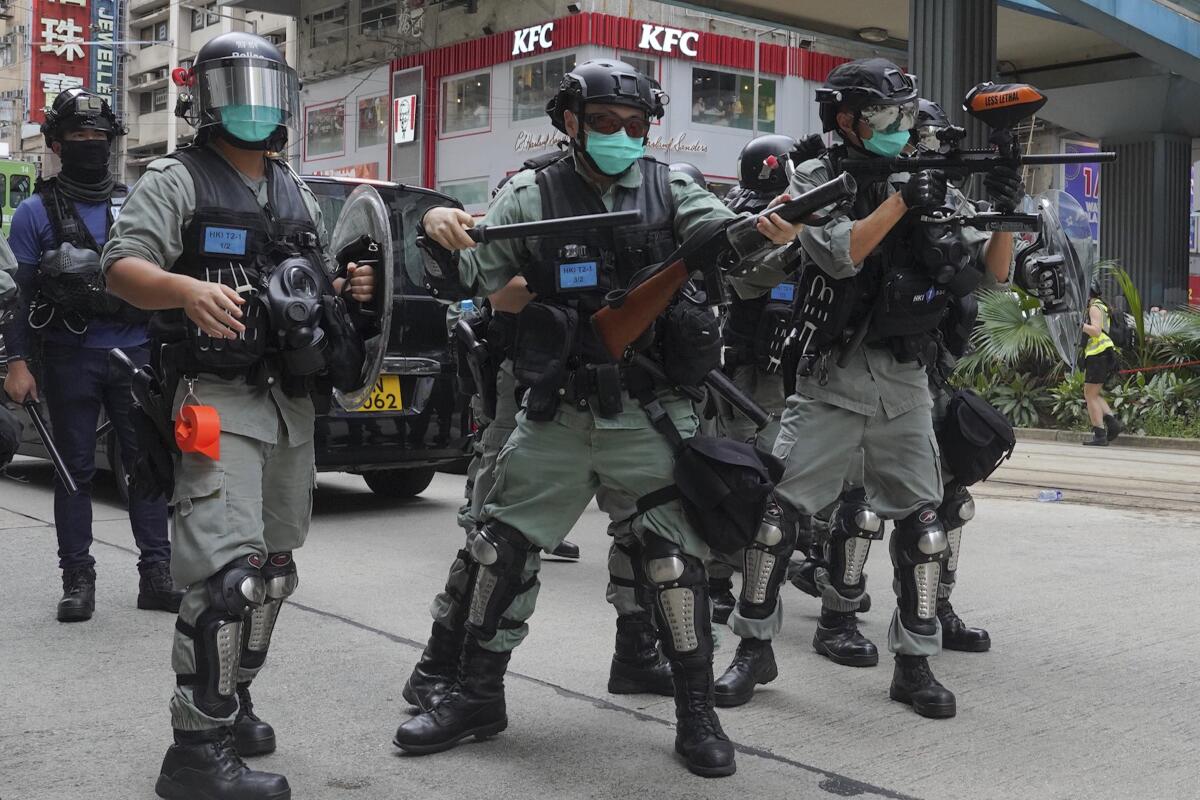Op-Ed: Hurting Hong Kong trade wonât protect pro-democracy forces or punish China

Thursday is the 31st anniversary of the Tiananmen Square protest. Chinaâs hostility to democracy â along with Hong Kongâs future â is again under the international spotlight. The Beijing government last week approved a new national security law aimed at preventing any âsedition, subversion, secession, treasonâ and âforeign interferenceâ in Hong Kong, a world financial hub. On Monday, the Hong Kong government for the first time banned the annual vigil to honor those killed at Tiananmen Square.
The new security law has attracted widespread international condemnation. In response, President Trump has announced that he plans to revoke Hong Kongâs special trade status, which has allowed the U.S. to treat Hong Kong separately from mainland China in terms of trade and financial transactions.
Last year, Congress enacted the Hong Kong Human Rights and Democracy Act, with the support of Hong Kong pro-democracy activists, which requires the State Department to conduct annual reviews of the cityâs autonomous status to justify its special trading status. Last week, Secretary of State Michael R. Pompeo declared that Hong Kong no longer has a high degree of autonomy from China.
But in truth, China has been gradually eroding the autonomy of Hong Kong over the last two decades, despite the âone country, two systemsâ structure. Thatâs why I do not believe that the new security law will necessarily result in more crackdowns by China on political dissenters and dissidents in Hong Kong.
The new law largely formalizes Beijingâs already aggressive intervention in Hong Kongâs political and economic affairs. It provides legal justifications for the repressive acts that were conducted covertly in the past, such as the mysterious disappearance of booksellers or the use of thugs and gangsters to attack pro-democracy activists.
The Chinese national security agencies (the Ministry of Public Security and the Ministry of State Security) may formally set up shop to exert direct control over Hong Kong rather than through ongoing behind-the-scenes collaboration with the Hong Kong Police Force, or the Chinese Communist Partyâs ties with thuggish United Front organizations, which are grass-roots groups allied with the mainland. Covert actions that took place in the middle of the night or in dark alleys may now be conducted legally and in broad daylight. The tactics used may change with the new law, but the intensity of repression may not.
What concerns me, however, is the lawâs deterrent effect on peopleâs behavior, rather than actual coercion by the government. The new law will rule by fear â protesters are likely to think twice before going out to the streets. Already, there have been reports of young activists deleting social media accounts, corporations banning employees from taking part in any public assembly, and spikes in emigration inquiries.
We should expect an exodus of talent from Hong Kong to safer environments where they will be better protected. In some ways, this will make Hong Kong look more like Singapore, where freedom of expression is largely curtailed because of self-censorship and draconian laws that punish fake-news spreaders and dissidents alike.
Ironically, the Trump administrationâs revocation of Hong Kongâs special trade status may deal a real blow to the city, but will not necessarily hurt Beijing. Revocation of special status works like sanctions, which can be a double-edged sword.
The size of Hong Kongâs economy as a portion of the mainlandâs has declined from 18% in 1997 to 3% today. Nonetheless, the city remains the preferred venue for mainland Chinese companies to raise capital, for Chinese multinationals to base their regional headquarters, and for American corporations to enter the Chinese market because of its favorable tariffs, better accounting and legal treatments and looser visa requirements.
Instead of summarily revoking the trading status, the Trump administration would be wiser to make the withdrawal a perpetual threat, one that could make Beijing leaders think twice before strangling Hong Kong any further. A complete rescission now would make Hong Kong like any other Chinese city. How would that help to protect its autonomy and bring about greater democracy?
Lynette H. Ong is a professor of political science at the University of Toronto. @onglynette
More to Read
A cure for the common opinion
Get thought-provoking perspectives with our weekly newsletter.
You may occasionally receive promotional content from the Los Angeles Times.










